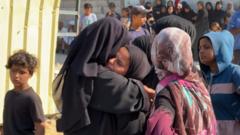The Israeli Defense Forces announce the establishment of humanitarian corridors and resumption of aid drops in response to mounting international criticism over the humanitarian crisis in Gaza.
**Humanitarian Aid Corridors Opened by Israel Amid International Pressure**

**Humanitarian Aid Corridors Opened by Israel Amid International Pressure**
Israel initiates humanitarian corridors for aid to Gaza as starvation concerns intensify.
Israel has announced plans to establish humanitarian corridors to facilitate aid transport into Gaza following intense international pressure. In a recent statement, the Israeli Defense Forces (IDF) confirmed that they would resume air drops of humanitarian assistance, starting with seven pallets of essential food supplies, including flour, sugar, and canned goods.
This initiative occurs as aid organizations raise alarm over potentially catastrophic conditions in Gaza, warning of mass starvation and reports of individuals starving to death. In their defense, the IDF claims they have initiated actions aimed at improving the humanitarian situation in the region, asserting readiness for "humanitarian pauses" in densely populated areas. However, they rejected allegations of deliberate starvation, labeling such claims as "false."
Additionally, the IDF announced the restoration of power to a desalination plant in Gaza, which they estimate will supply approximately 900,000 residents with water. Despite these measures, the UN, various aid groups, and some international allies have criticized Israel, attributing the humanitarian crisis to the blockade and calling for unrestricted aid access.
According to the Hamas-run Gaza health ministry, over 125 deaths have been reported due to malnutrition, with children making up a significant proportion of this tragic statistic. The IDF maintains that the responsibility for food distribution in Gaza falls to the UN and international organizations, emphasizing that these groups must ensure that assistance does not reach Hamas.
Since March, Israel had cut off supplies to Gaza, only to restart with several restrictions in May. Israeli officials argue that they have provided sufficient aid during the ongoing conflict, insisting Hamas is responsible for the hardships faced by Gazan civilians.
This initiative occurs as aid organizations raise alarm over potentially catastrophic conditions in Gaza, warning of mass starvation and reports of individuals starving to death. In their defense, the IDF claims they have initiated actions aimed at improving the humanitarian situation in the region, asserting readiness for "humanitarian pauses" in densely populated areas. However, they rejected allegations of deliberate starvation, labeling such claims as "false."
Additionally, the IDF announced the restoration of power to a desalination plant in Gaza, which they estimate will supply approximately 900,000 residents with water. Despite these measures, the UN, various aid groups, and some international allies have criticized Israel, attributing the humanitarian crisis to the blockade and calling for unrestricted aid access.
According to the Hamas-run Gaza health ministry, over 125 deaths have been reported due to malnutrition, with children making up a significant proportion of this tragic statistic. The IDF maintains that the responsibility for food distribution in Gaza falls to the UN and international organizations, emphasizing that these groups must ensure that assistance does not reach Hamas.
Since March, Israel had cut off supplies to Gaza, only to restart with several restrictions in May. Israeli officials argue that they have provided sufficient aid during the ongoing conflict, insisting Hamas is responsible for the hardships faced by Gazan civilians.


















